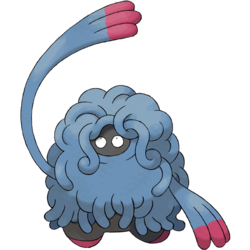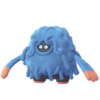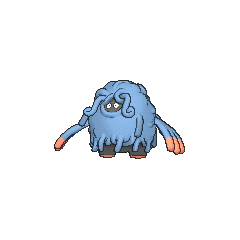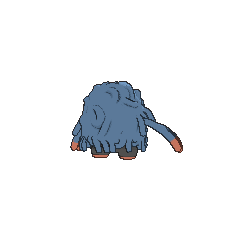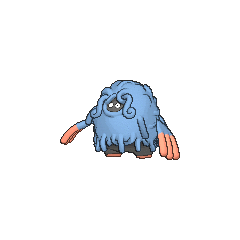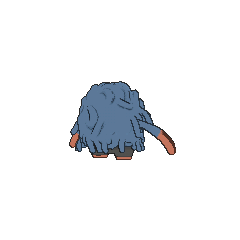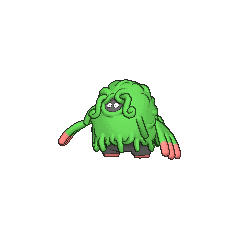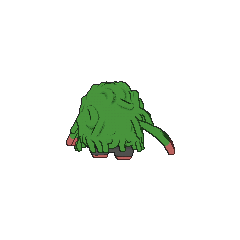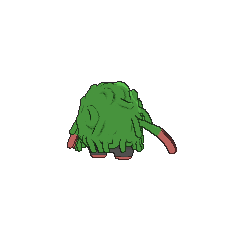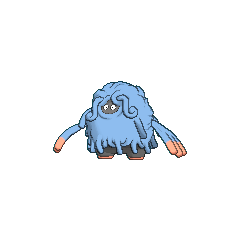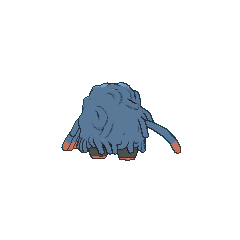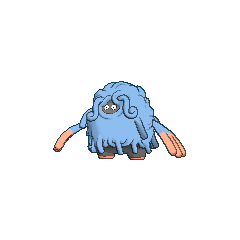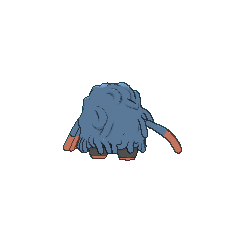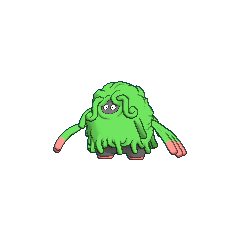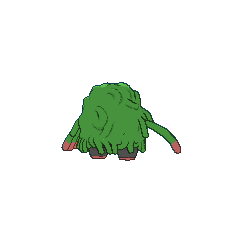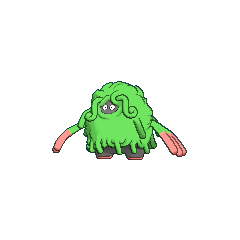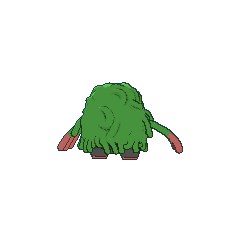From Bulbapedia, the community-driven Pokémon encyclopedia.
Tangrowth (Japanese: モジャンボ Mojumbo) is a Grass-type Pokémon introduced in Generation IV.
It evolves from Tangela when leveled up while knowing Ancient Power.
Biology
Tangrowth is a large Pokémon with a black body wrapped in a large mass of blue vines. The vines are used to entangle foes and prey. A pair of saucer-like eyes peeks out from beneath the tangled mess of vines. However, these eyes may be hidden in warm seasons due to how profusely the vines grow. Its stubby black feet are tipped with red. Tangrowth has a pair of blue boneless arms that have three fingers. These fingers are completely red on a female Tangrowth, while they have red tips on a male.
Tangrowth is unfazed if one of its arms is broken off, as it will easily grow back. It hunts by disguising itself as a shrub, then grabbing prey with its vines. Predators like to eat Tangrowth's vines. Tangrowth is very rare in the wild, though it can be found in temperate grasslands.
In the anime
Major appearances
Tangrowth made its main series debut in Promoting Healthy Tangrowth!, where it was trying to save a dying tree that was a key part of the forest. With the help of Ash and his friends, it was able to save the tree.
A Tangrowth appeared in Zoroark: Master of Illusions, under the ownership of Tammy; it helps her at her flower shop. Tangrowth later worked alongside Joe's Mightyena to stop Zorua from escaping when they spotted it.
Minor appearances
Tangrowth debuted in The Rise of Darkrai.
A Tangrowth briefly appeared in Working on a Right Move!, under the ownership of a Trainer competing in the Lily of the Valley Conference. It was shown defeating another Trainer's Hippowdon.
A Tangrowth appeared in Mewtwo's flashback in Genesect and the Legend Awakened.
Pokédex entries
| Episode
|
Pokémon
|
Source
|
Entry
|
| DP134
|
Tangrowth
|
Dawn's Pokédex
|
Tangrowth, the Vine Pokémon. Tangrowth captures its prey by extending its arms, which are made of vines.
|
|
In the manga
In the Phantom Thief Pokémon 7 manga
Hiori has a Tangrowth, which debuted in Challenge From A Rival. Its vines can be used as ropes to lower Hiori and others down from roofs. It can also use Sleep Powder to help Hiori get by guards.
In the Pokémon Adventures manga
In Getting Past Gastrodon, Jupiter attacked Platinum, Candice, and Maylene using her Tangrowth, Sableye, and Gastrodon when they arrived in Lake Acuity. Most notably, it faced off against Candice's Abomasnow, and was able to overpower and defeat it using a Fire-typed Natural Gift. In subsequent appearances, Jupiter's Tangrowth used only Natural Gift, and its strategy was easily worked around.
A Tangrowth liberated by Team Plasma appeared in PS547 as one of the Pokémon stuck in N's Castle.
In the Pokémon Diamond and Pearl Adventure! manga
A Tangrowth appeared in A Novel Test!!, under the ownership of Jupiter.
In the TCG
- Main article: Tangrowth (TCG)
Game data
Pokédex entries
| This Pokémon was unavailable prior to Generation IV.
|
| Generation IV
|
|
Sinnoh
Pt: #182
|
|
Johto
#183
|
| Diamond
|
It ensnares prey by extending arms made of vines. Losing arms to predators does not trouble it.
|
| Pearl
|
| Platinum
|
Its arms are made of plants that bind themselves to things. They grow back right away if cut.
|
| HeartGold
|
When it remains still, it appears to be a large shrub. Unsuspecting prey that wander near get ensnared by its vines.
|
| SoulSilver
|
Its vines grow so profusely that, in the warm season, you can't even see its eyes.
|
|
|
| Generation V
|
|
|
Unova
B2W2: #218
|
| Black
|
Its arms are made of plants that bind themselves to things. They grow back right away if cut.
|
| White
|
| Black 2
|
Even if one of its arms is eaten, it's fine. The Pokémon regenerates quickly and will go right back to normal.
|
| White 2
|
|
|
| Generation VI
|
|
Kalos
#—
|
|
Hoenn
#—
|
| X
|
It ensnares prey by extending arms made of vines. Losing arms to predators does not trouble it.
|
| Y
|
Its vines grow so profusely that, in the warm season, you can't even see its eyes.
|
| Omega Ruby
|
It ensnares prey by extending arms made of vines. Losing arms to predators does not trouble it.
|
| Alpha Sapphire
|
Its vines grow so profusely that, in the warm season, you can't even see its eyes.
|
|
|
|
|
| Generation VIII
|
|
|
Galar
Isle of Armor #081
|
| Sword
|
Tangrowth has two arms that it can extend as it pleases. Recent research has shown that these arms are, in fact, bundles of vines.
|
| Shield
|
Vine growth is accelerated for Tangrowth living in warm climates. If the vines grow long, Tangrowth shortens them by tearing parts of them off.
|
|
|
Game locations
| This Pokémon was unavailable prior to Generation IV.
|
|
|
|
|
|
|
|
|
|
|
In side games
| This Pokémon was unavailable prior to Generation IV.
|
|
|
|
|
|
|
In events
Held items
In-game trades
Stats
Base stats
| Stat
|
Range
|
| At Lv. 50
|
At Lv. 100
|
100
|
|
160 - 207
|
310 - 404
|
100
|
|
94 - 167
|
184 - 328
|
125
|
|
117 - 194
|
229 - 383
|
110
|
|
103 - 178
|
202 - 350
|
50
|
|
49 - 112
|
94 - 218
|
50
|
|
49 - 112
|
94 - 218
|
Total: 535
|
Other Pokémon with this total
|
- Minimum stats are calculated with 0 EVs, IVs of 0, and (if applicable) a hindering nature.
- Maximum stats are calculated with 252 EVs, IVs of 31, and (if applicable) a helpful nature.
|
Pokéathlon stats
Type effectiveness
| Under normal battle conditions in Generation IX, this Pokémon is:
|
|
|
|
|
|
|
|
|
|
|
|
|
Learnset
|
|
|
|
- Bold indicates a move that gets STAB when used by Tangrowth
- Italic indicates a move that gets STAB only when used by an Evolution of Tangrowth
- Click on the generation numbers at the top to see level-up moves from other generations
|
|
|
|
|
- Bold indicates a move that gets STAB when used by Tangrowth
- Italic indicates a move that gets STAB only when used by an Evolution of Tangrowth
- Click on the generation numbers at the top to see TM moves from other generations
|
|
|
|
|
- Moves marked with an asterisk (*) must be chain bred onto Tangrowth in Generation VIII
- Moves marked with a double dagger (‡) can only be bred from a Pokémon who learned the move in an earlier generation.
- Moves marked with a superscript game abbreviation can only be bred onto Tangrowth in that game.
- Bold indicates a move that gets STAB when used by Tangrowth
- Italic indicates a move that gets STAB only when used by an Evolution of Tangrowth
- Click on the generation numbers at the top to see Egg moves from other generations
|
|
|
|
|
- Bold indicates a move that gets STAB when used by Tangrowth
- Italic indicates a move that gets STAB only when used by an Evolution of Tangrowth
- Click on the generation numbers at the top to see Move Tutor moves from other generations
|
Side game data
|
|
|
|
Pokémon Ranger: Guardian Signs
| Group:
|
|
Poké Assist:
(present)
|

|
Field move:
(present)
|

(Crush ×3)
|
Poké Assist:
(past)
|

|
Field move:
(past)
|

(Crush ×1)
|
| Browser entry R-289/N-053
|
| It creates vines around itself that make Pokémon Slowed.
|
|
|
|
|
|
|
|
|
|
|
|
|
Evolution
Sprites
| This Pokémon was unavailable prior to Generation IV.
|
|
|
|
|
|
|
|
|
Trivia
Origin
Due to the mystery around Tangela's appearance under the vines, Tangrowth may be based on the swamp monster from the short story "It!" by Theodore Sturgeon, that is ultimately revealed to have formed around a human skeleton. It may also be based on a Green Man, a motif that is represented as a face surrounded by leaves and vines.
Its Pokédex entries state that its vines will bind and ensnare its surroundings. This may be a reference to thigmotropism, a biological reaction plants have towards contact that encourages them to coil around objects they touch as they grow, allowing stability in their stems and branches.
Name origin
Tangrowth is a combination of tangle and growth.
Mojumbo is a combination of もじゃもじゃ mojamoja (shaggy or unkempt) and jumbo (referring to its size).
In other languages
| Language
|
Title
|
Meaning
|
 Japanese Japanese
|
モジャンボ Mojumbo
|
From もじゃもじゃ mojamoja and jumbo
|
 French French
|
Bouldeneu
|
From boule de nœuds
|
 Spanish Spanish
|
Tangrowth
|
Same as English name
|
 German German
|
Tangoloss
|
From Tangela or Tang and Koloss
|
 Italian Italian
|
Tangrowth
|
Same as English name
|
 Korean Korean
|
덩쿠림보 Deongkurimbo
|
From 덩굴 deong'gul, 넝쿨 neong'kul, 림 (森) rim, and jumbo
|
 Mandarin Chinese Mandarin Chinese
|
巨蔓藤 Jùmànténg
|
From 巨 jù and 蔓藤 mànténg
|
 Cantonese Chinese Cantonese Chinese
|
巨蔓藤 Geuihmaahntàhng
|
Same as Mandarin name
|
|
|
|
| More languages
|
 Thai Thai
|
โมจัมโบ Mojumbo
|
Transcription of trademarked Japanese name
|
|
|
|
External links

|
This Pokémon article is part of Project Pokédex, a Bulbapedia project that aims to write comprehensive articles on each Pokémon species, as well as Pokémon groups and forms.
|

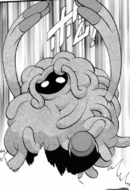
 For other sprites and images, please see Tangrowth images on the Bulbagarden Archives.
For other sprites and images, please see Tangrowth images on the Bulbagarden Archives.
